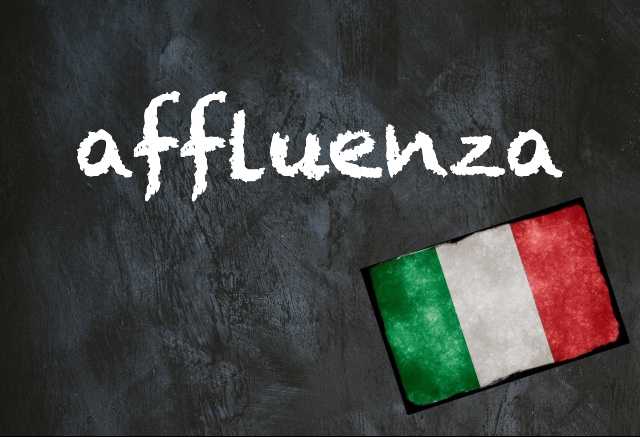Italian word of the day: 'Affluenza'

This word has particular relevance to yesterday's events... can you guess what it might turn out to mean?
Yes, in English it's a risible legal defence used by rich criminals to avoid a prison sentence.
But in Italian affluenza is something else entirely. It means attendance or turnout; most commonly, voter turnout.
And based on what we know so far about the yesterday's general election, this is something that appears to be in sharp decline in Italy.
Sembra che l'affluenza sia in forte calo.
There seems to be a sharp decline in turnout.
Speriamo che l'affluenza sarà più elevata questa volta.
We hope that the turnout will be higher this time.
That's not its only use, however: affluenza also refers to a flow, as in a literal flow of water:
L'affluenza di acqua è più bassa che mai quest'anno.
The flow of water is lower than ever this year.
Or a figurative flow or influx, such as economic or migratory movements:
Negli ultimi anni l'economia ha beneficiato di un'affluenza di lavoratori dall'estero.
In the last few years the economy has benefitted from an influx of workers from abroad.
Based on these uses of the word, you can hazard a good guess as to where our 'affluence' originates: it's from the Latin affluentia, meaning an abundant flow, a copiousness, or an extravagance.

We do in fact retain the alternative definition of 'affluence' in English to mean an influx of people or things (e.g., "Venice receives an affluence of visitors from all over the world") - it just sounds a little outdated to modern ears.
If you want to say 'affluence' in Italian?
You could use any of benessere, agiatezza, richezza, or opulenza.
Nonostante la loro agiatezza, spendono pochissimo, risparmiando tutto il loro patrimonio per la pensione.
Despite their affluence they spend very little money, saving all their wealth for their retirement.
And don't fall into the trap of thinking affluente means 'affluent' either - there, you'd be talking about a tributary of a river. Instead, you'll want agiato, benestante, or ricco.

Do you have an Italian word you’d like us to feature? If so, please email us with your suggestion.
Comments
See Also
Yes, in English it's a risible legal defence used by rich criminals to avoid a prison sentence.
But in Italian affluenza is something else entirely. It means attendance or turnout; most commonly, voter turnout.
And based on what we know so far about the yesterday's general election, this is something that appears to be in sharp decline in Italy.
Sembra che l'affluenza sia in forte calo.
There seems to be a sharp decline in turnout.
Speriamo che l'affluenza sarà più elevata questa volta.
We hope that the turnout will be higher this time.
That's not its only use, however: affluenza also refers to a flow, as in a literal flow of water:
L'affluenza di acqua è più bassa che mai quest'anno.
The flow of water is lower than ever this year.
Or a figurative flow or influx, such as economic or migratory movements:
Negli ultimi anni l'economia ha beneficiato di un'affluenza di lavoratori dall'estero.
In the last few years the economy has benefitted from an influx of workers from abroad.
Based on these uses of the word, you can hazard a good guess as to where our 'affluence' originates: it's from the Latin affluentia, meaning an abundant flow, a copiousness, or an extravagance.

We do in fact retain the alternative definition of 'affluence' in English to mean an influx of people or things (e.g., "Venice receives an affluence of visitors from all over the world") - it just sounds a little outdated to modern ears.
If you want to say 'affluence' in Italian?
You could use any of benessere, agiatezza, richezza, or opulenza.
Nonostante la loro agiatezza, spendono pochissimo, risparmiando tutto il loro patrimonio per la pensione.
Despite their affluence they spend very little money, saving all their wealth for their retirement.
And don't fall into the trap of thinking affluente means 'affluent' either - there, you'd be talking about a tributary of a river. Instead, you'll want agiato, benestante, or ricco.

Do you have an Italian word you’d like us to feature? If so, please email us with your suggestion.

Join the conversation in our comments section below. Share your own views and experience and if you have a question or suggestion for our journalists then email us at [email protected].
Please keep comments civil, constructive and on topic – and make sure to read our terms of use before getting involved.
Please log in here to leave a comment.